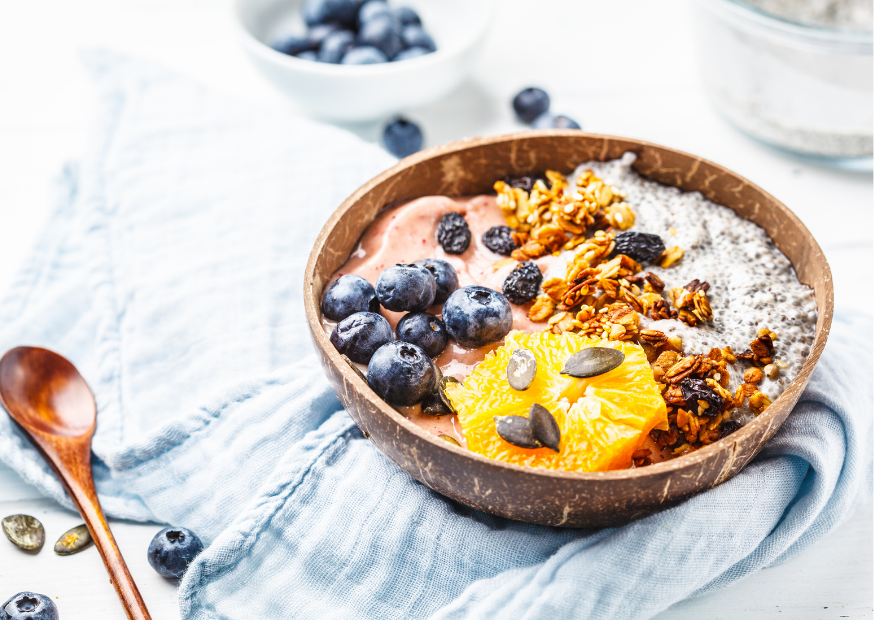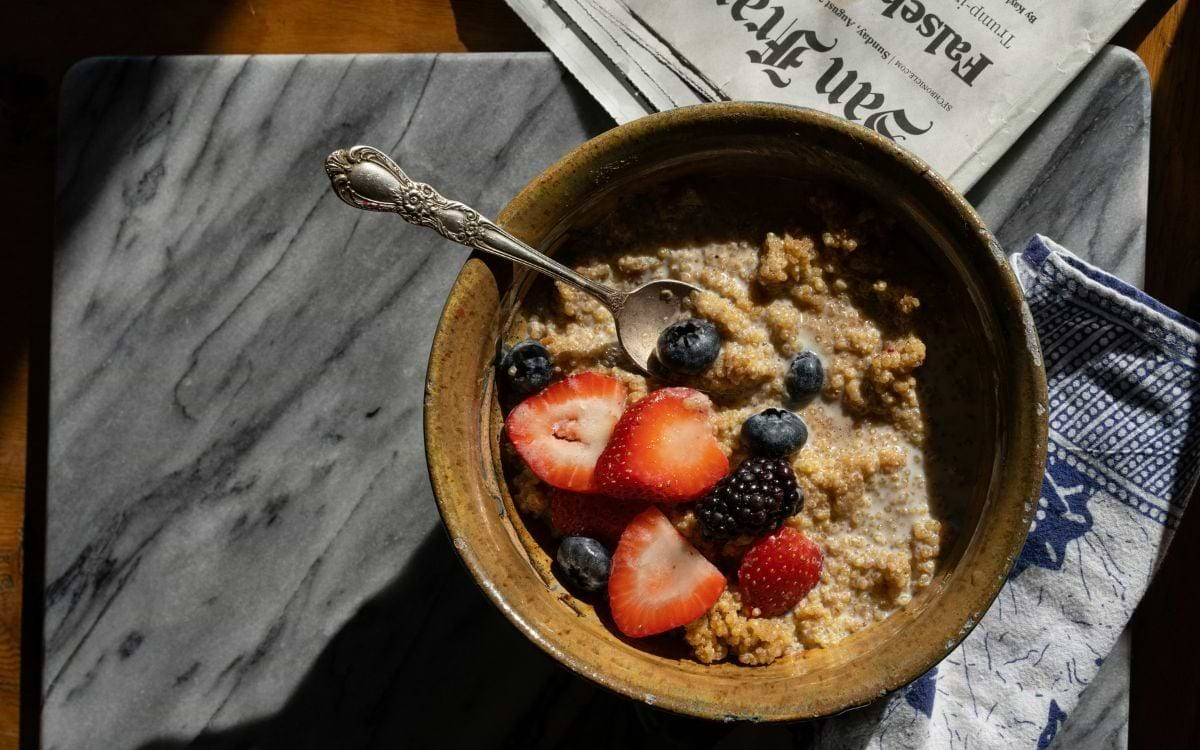The Ultimate Guide to the Ideal Breakfast
We are mostly accustomed to starting the day with cereal for breakfast, or perhaps toast with jam. While these meals are easy to prepare and delightfully tasty, how do they fare from a nutritional standpoint? Are they really the best choices?
Answer in the article below
The Problems with These Types of Breakfasts
Whether it's bread, orange juice, jam, or puffed cereals, these foods tend to deliver a large amount of carbohydrates rapidly to the body. Their glycemic index (GI) is high and promotes insulin secretion. As a result, reactive hypoglycemia follows, leading to the famous "mid-morning slump": after the sugar intake, the pancreas secretes insulin to regulate this rapid increase in blood sugar levels. But once the blood sugar is regulated, it drops, and fatigue sets in. The result is a sudden craving for quick energy, which we often seek... in more sugar!
The second problem is that they provide very few beneficial elements for the body. Aside from simple sugars, these products lack fiber, vitamins, and minerals and only provide empty calories. These empty calories are calories that, for the most part, have no significant nutritional value but can quickly add up because they are dense in carbohydrates and sometimes fats. In short: these are calories that don't provide your body with the necessary nutrients for its proper functioning.

In Practice: The Right Choices
Since breakfast is the first meal of the day, it sets the tone for the nutritional balance of the next 12 hours. If it's well-balanced, it will provide you with the energy you need until the next meal, stave off snacking, and even help regulate your food choices for the rest of the day.
Proteins
A good breakfast should first and foremost include proteins. Proteins are crucial for boosting the production of dopamine, the neurotransmitter responsible for alertness and motivation. It helps you stay motivated for the rest of the day and stay focused throughout the morning. The intake of proteins also helps keep you fuller for longer, thus preventing snacking before lunch.
Ideas for adding protein to your morning meal:
- Eggs
- Silken tofu
- Protein powder
- Chia seeds soaked in plant-based milk
- Pulse peanut butter
- Soy milk
Fats
To complement these proteins, a good source of fats is essential. Fats, long overlooked, are crucial for the proper functioning of our body when chosen wisely. The morning is the best time to consume them, as the enzymes responsible for digesting them are produced in large quantities after waking up. They will be digested more efficiently, stabilize your blood sugar, and are highly satiating. Opt for nuts like almonds, walnuts, and hazelnuts, either raw or in butter form. Nut butters, like almond butter, are excellent substitutes for butter or jam. Choose one with no added sugar, and preferably, opt for one that’s not roasted to preserve the benefits of the nuts. Also, consider adding seeds like chia, hemp, or flax to your porridges, muesli, or smoothie bowls.

Carbohydrates
Carbohydrates are not incompatible with a good breakfast, but it's important to choose them wisely. Opt for whole grains like oats or buckwheat, or muesli with no added sugars. You can also choose flaked beans, quinoa, or spelt flakes, which are even richer in protein. Breakfast cereals are often extruded to achieve their crispy texture, making them much higher on the glycemic index. For instance, cooked oats have a GI of less than 60, but puffed oats are close to 80! If you prefer toast, opt for whole-grain or sourdough bread, which is lower on the glycemic index: a traditional white bread has a GI of about 80, while sourdough is closer to 65 and more digestible.
Regarding beverages, say goodbye to your orange juice and instead eat the whole fruit: this way, you'll benefit from its fiber, which helps reduce its glycemic index. An orange has a GI of 40, compared to 60 in juice. Plus, by taking the time to chew, you'll feel more satisfied.
If possible, save your coffee for mid-morning. It doesn’t mix well with calcium and magnesium, which are often part of a typical breakfast. Instead, go for green tea, and if you prefer caffeine-free options, try rooibos (red tea) or herbal teas like chicory, which is caffeine-free and has the texture and color of coffee, while also promoting good digestion.
Balanced Breakfast Ideas
Example 1:
- Organic whole grain sourdough bread
- Almond butter
- 1 fruit
- 1 chicory
Example 2:
- Spelt flakes
- Hazelnuts
- Dried apricots chopped
- Coconut flakes
- Plant milk
- 1 rooibos
Example 3:
Homemade smoothie with:
- Berries
- Spinach
- Peanut butter
- Silken tofu
- Filtered water
Example 4:
- Sprouted bread
- Avocado
- 1 or 2 soft-boiled eggs
- 1 green tea

Note: I’ve intentionally omitted quantities, as these depend on the individual. We all have our own needs, and it's important to tailor our diet accordingly.
Conclusion
These simple tips will help you tackle your day more easily, I'm sure of it! Don't hesitate to try them over several days, alternating between your usual breakfast and an improved one following the advice above. You'll notice the difference in terms of energy and focus, I’m sure!
Take care of yourself!
Lucile, Nutritionist at Kazidomi
FAQ - Breakfast and Nutrition
-
Why avoid processed cereals for breakfast?
Processed cereals have a high glycemic index, causing blood sugar spikes followed by cravings. Opt for whole cereals like oats.
-
Are fruits recommended for breakfast?
Yes, fresh fruits, rich in fiber, help stabilize blood sugar. It's better to eat the whole fruit rather than drink its juice, which contains less fiber.
-
How much protein should I have in the morning?
Protein intake should be enough to maintain energy. On average, a portion of eggs, tofu, or plain yogurt is ideal to start the day well.
-
What are the best drinks to accompany breakfast?
Opt for drinks like green tea or chicory. Coffee is better consumed mid-morning to avoid interfering with the absorption of certain minerals.
-
Are fats important in the morning?
Yes, healthy fats from nuts or avocado help stabilize blood sugar and provide lasting satiety. Incorporate almonds, walnuts, or nut butters into your meal.
-
Can I eat carbs in the morning?
Carbs are not to be avoided, but choose low glycemic options like buckwheat flakes, quinoa, or whole-grain sourdough bread.
-
What’s the difference between a high-protein and high-carb breakfast?
A high-protein breakfast provides longer satiety and better blood sugar regulation, while a high-carb breakfast leads to cravings and energy drops.
-
Why avoid orange juice at breakfast?
Orange juice, even fresh, has a high glycemic index. It's better to eat a whole orange to benefit from its fiber and reduce its impact on blood sugar.
-
Is it recommended to drink coffee first thing in the morning?
Coffee can interfere with calcium and magnesium absorption. It's advised to consume it mid-morning rather than at breakfast.
-
How to include seeds in a balanced breakfast?
Chia, flax, or hemp seeds are rich in fiber and healthy fats. Add them to recipes like porridge, smoothies, or simply sprinkle on plain yogurt.
